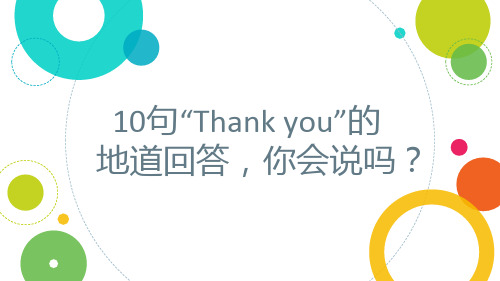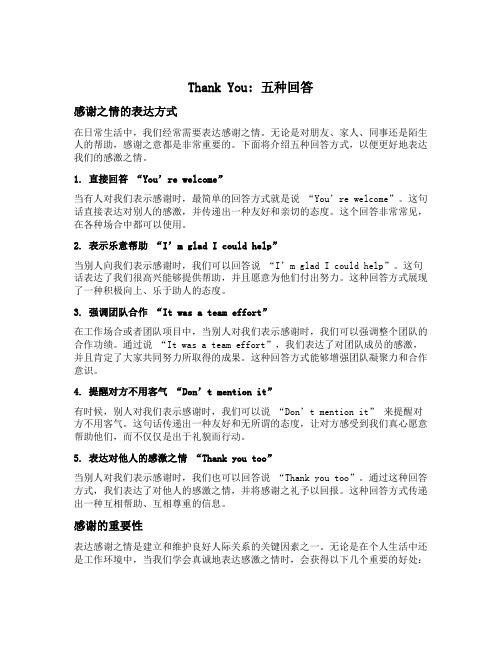thank you的回答方法
10句“Thank you”的地道回答,你会说吗?

从前老师或许只教了你用这句话回答“sorry”,实际 上这句话也能用来回答谢谢。right这个词有“正确、 恰当”的意思。That’s all right的字面意思就是“一切 都没什么不妥”,演变成“没关系”的意思。
5.Don’t mention it 不用谢
这是一种礼貌的回应方式,意 思就美国人了,这个“当然” 指的是“帮助别人是理所当然的”,并 不是“说谢谢是理所当然的”。现在你 可以理解sure的语境了:没什么,我 帮助你是应该的。
10
Of course 没事,这是当然的
PPT模板下载:/moban/ 节日PPT模板:/jieri/ PPT背景图片:/beijing/ 优秀PPT下载:/xiazai/ Word教程: /word/ 资料下载:/ziliao/ 范文下载:/fanwen/ 教案下载:/jiaoan/ 字体下载:/ziti/
简单点说就是“不用谢”。
PPT模板下载:/moban/ 节日PPT模板:/jieri/ PPT背景图片:/beijing/ 优秀PPT下载:/xiazai/ Word教程: /word/ 资料下载:/ziliao/ 范文下载:/fanwen/ 教案下载:/jiaoan/ 字体下载:/ziti/
行业PPT模板:/hangye/ PPT素材下载:/sucai/ PPT图表下载:/tubiao/ PPT教程: /powerpoint/ Excel教程:/excel/ PPT课件下载:/kejian/ 试卷下载:/shiti/
10句“Thank you”的 地道回答,你会说吗?
Thank you!
生活中“Thank you”的使用频率非常高,而回 复的用法可不止“You're welcome”,今天,
要来盘点一下地道的“不客气”。
英语情景交际用法总结(完整)

高中英语情景交际总结及练习1.回答对方感谢(Thanks)—Thank you!—It’s a pleasure./My pleasure./Don’t mention it./That’s all right./You are welcome. 2.回答对方道歉(Apologies)—Sorry.—Never mind./It doesn’t matter./It’s all right./Forget it./That’s all right.3.回答对方请求—Can I.../Could I.../Would you mind if I...—1)Yes, please./Sure./Certainly./Of course./Please do./Of course, you can./Go ahead, please.—2)I am sorry; it’s not allowed./I’m afraid not./You’d better not./I’d rather you didn’t.4.回答对方提供帮助—Would you like me to help...—1)Yes, please./That’s very kind of you./Thank you. That would be nice./Thank you for your help.—2)No, thanks./Thank you all the same./It’s very kind of you, but I can manage it myself.5.表示同意和不同意—1)Sure./certainly./Exactly./Absolutely./That’s correct./Of course./All right.(好的)/I agree./I can’t agree more./That’s a good idea./Yes, I think so./ That’s exactly what I was thinking./That’s just how I see it.—2)No way./Of course not./I’m afraid I don’t agree./I don’t think so./Well, it depends./Well, I am not sure about it.6.几个常见的短语:1.So do I. “So+助动词+主语”表述前面一种表肯定意义的情况也适合后面的另一个人,意为“某人也一样”。
道谢与道歉常用的英语口语

道谢与道歉常用的英语口语关于道谢与道歉常用的英语口语英语口语是被英语国家人民普遍应用的口头交流的语言形式。
英语口语通常是通过声音传播的。
英语文学作品中也常以书面形式记叙英语口语。
英语口语灵活多变,多因场合与发言者不同而被自由使用。
以下是店铺为大家整理的道谢与道歉常用的英语口语,供大家参考借鉴,希望可以帮助到有需要的朋友。
一、关于道谢【道谢用语】1. Thank you (very much). / Thanks a lot. / Many thanks.2. Thanks for your help. / Thank you for the lovely gift / for your invitation.3. It’s very kind / nice of you.4. I can never thank you enough. / I really don’t know howI can thank you enough.5. Thank you all the same.(用于当别人因某种原因没能帮你时。
)【对道谢的应答】1. Not at all.2. That’s all right. / That’s OK.3. You’re welcome.4. Don’t mention it.5. It’s my pleasure.6. I’m very glad you enjoyed it.注意:在答复别人的道谢时,不可受汉语习惯的影响回答出诸如This is what I should do或It’s my duty等答语,因为这给人“不是出于自愿,而是为完成任务不得已而为之”的感觉。
二、关于道歉【道歉用语】1. Excuse me.(常用来事前道歉。
如:向别人打听情况或打断别人的讲话等。
)2. Sorry. / I’m sorry. / Sorry to call you so late. / Sorry to have kept you waiting. / I’m sorry for losing your book. / I can’t tell you how sorry I am.3. It was my fault. / My mistake. It won’t happen again.4. Will you forgive me? / Please forgive me.5. Pardon me for sneezing.6. I apologize. / Please accept my apologies for what I said just now.7. I must have caused you a lot of trouble.8. I didn’t mean t o step on your foot.9. I beg your pardon.【对道歉的应答】1. That’s OK. / That’s all right.2. It doesn’t matter.3. It’s nothing.4. Forget it.5. You’re forgiven.6. Never mind.7. Don’t worry about it.8. No problem. We all make mistakes.1. Thanks a lot.2. Thanks very much.3. Thank you very much.4. Thank you so much.Tips:如果你想要强调你的感激之情,或表示礼貌,你可以用以上四种方法来表达。
英语中对方表达感谢应该怎么回复

英语中对方表达感谢应该怎么回复1. 表达“感谢”的英语句子有哪些Thank you very much. 非常感谢你。
2. Thanks a lot. 太感谢你了。
3. Thanks a million.感激不尽。
表达“感谢”的英语句子: 1、I appreciate your support. 我很感激你的支持。
2、I don't know how to express my gratitude. 我不知道怎麽表达我的谢意。
3、I owe you one. 我欠你一份人情。
4、I'm much obliged to you. 我对你满怀感激。
5、I'm grateful for your help. 我很感谢你的帮忙。
6、I'm in your eternal debt. 我欠你的一辈子都还不完。
7、Thanks anyway. 无论如何,还是谢谢你。
(注:本句用在对方虽然没能帮上忙,但你仍想表达谢意)8、Thank you for contacting us. 有人写信来询问公司的服务,向他们对公司的兴趣表示感谢。
9、Thank you for all your assistance. 有人给了你特别的帮助,一定要感谢他们! 10、Thank you raising your concerns. 就算某个客户或是经理写邮件给你对你的工作提出了一定的质疑,你还是要感谢他们。
2. 表示感谢的句子表达感谢的英语句子 Cheers.谢谢。
Great.好极了。
I can never thank you enough for you generosity.我对您的慷慨大度永远感激不尽。
I can never thank you enough.我对您永远感激不尽。
I cannot sufficiently express my thanks for your thoughtful kindness.对于你给予我的无微不至的关怀,不胜感谢。
高中英语情景交际用法总结及经典习题(含答案)

高中英语情景交际总结及练习1.回答对方感谢(Thanks)—Thank you!—It’s a pleasure./My pleasure./Don’t mention it./That’s all right./You are welcome. 2.回答对方道歉(Apologies)—Sorry.—Never mind./It doesn’t matter./It’s all right./Forget it./That’s all right.3.回答对方请求—Can I.../Could I.../Would you mind if I...—1)Yes, please./Sure./Certainly./Of course./Please do./Of course, you can./Go ahead, please.—2)I am sorry; it’s not allowed./I’m afraid not./You’d better not./I’d rather you didn’t.4.回答对方提供帮助—Would you like me to help...—1)Yes, please./That’s very kind of you./Thank you. That would be nice./Thank you for your help.—2)No, thanks./Thank you all the same./It’s very kind of you, but I can manage it myself.5.表示同意和不同意—1)Sure./certainly./Exactly./Absolutely./That’s correct./Of course./All right.(好的)/I agree./I can’t agree more./That’s a good idea./Yes, I think so./ That’s exactly what I was thinking./That’s just how I see it.—2)No way./Of course not./I’m afraid I don’t agree./I don’t think so./Well, it depends./Well, I am not sure about it.6.几个常见的短语:1.So do I. “So+助动词+主语”表述前面一种表肯定意义的情况也适合后面的另一个人,意为“某人也一样”。
thank you的五种回答

Thank You: 五种回答感谢之情的表达方式在日常生活中,我们经常需要表达感谢之情。
无论是对朋友、家人、同事还是陌生人的帮助,感谢之意都是非常重要的。
下面将介绍五种回答方式,以便更好地表达我们的感激之情。
1. 直接回答“You’re welcome”当有人对我们表示感谢时,最简单的回答方式就是说“You’re welcome”。
这句话直接表达对别人的感激,并传递出一种友好和亲切的态度。
这个回答非常常见,在各种场合中都可以使用。
2. 表示乐意帮助“I’m glad I could help”当别人向我们表示感谢时,我们可以回答说“I’m glad I could help”。
这句话表达了我们很高兴能够提供帮助,并且愿意为他们付出努力。
这种回答方式展现了一种积极向上、乐于助人的态度。
3. 强调团队合作“It was a team effort”在工作场合或者团队项目中,当别人对我们表示感谢时,我们可以强调整个团队的合作功绩。
通过说“It was a team effort”,我们表达了对团队成员的感激,并且肯定了大家共同努力所取得的成果。
这种回答方式能够增强团队凝聚力和合作意识。
4. 提醒对方不用客气“Don’t mention it”有时候,别人对我们表示感谢时,我们可以说“Don’t mention it” 来提醒对方不用客气。
这句话传递出一种友好和无所谓的态度,让对方感受到我们真心愿意帮助他们,而不仅仅是出于礼貌而行动。
5. 表达对他人的感激之情“Thank you too”当别人对我们表示感谢时,我们也可以回答说“Thank you too”。
通过这种回答方式,我们表达了对他人的感激之情,并将感谢之礼予以回报。
这种回答方式传递出一种互相帮助、互相尊重的信息。
感谢的重要性表达感谢之情是建立和维护良好人际关系的关键因素之一。
无论是在个人生活中还是工作环境中,当我们学会真诚地表达感激之情时,会获得以下几个重要的好处:1. 增强人际关系当我们对别人的帮助表示感谢时,会增强彼此之间的联系和互动。
回答thankyou(共10篇)
回答thankyou(共10篇)回答thankyou(一): 怎么回答thank you常用的回答是什么不用谢.You"re welcome.不用谢.You are welcome.不用谢.It was my pleasure.不用谢.Thanks a lot.Don"t mention it.不用谢.Thank you.Not at all.不用谢.Thank you.You are welcome.那没什么,不用谢.That"s all right,you"re welcome.算不了什么,不用谢Forget it不用谢,我不要任何报酬,不用记在心上.No thanks,I don"t want any payment - skip it.我知道你很感激,不过那没什么,不用谢.I know you"re grateful,but that"s all right,any time. 以上这些都是谦虚的回答!当然亦有不谦虚的回答!回答thankyou(二): 回答thank you,sorry的答语越全越好1、回答THANK YOU最常用的正式用语是you are welcome,但是也不是100%适用.比如你付帐以后,收银员说thank you,你也应该回答thank you,重音放在you上表示你多谢他们的服务.如果你提供了帮助,可以说you are welcome,也可以用my pleasure.如果对方是你的上级,要员,或者名人一类,还可以用It’s my honour.年轻人在休闲情况下没有那么多限制,一句通用,最常的是cheers.cheers可以表示谢,也可以用来不用谢,反正年轻人的方式自由很多.澳洲口语里no worries也很常用,同样意思的还有no problem,表示没问题,小事一桩.2、1.That"s OK!没关系!2.That"s alright!没关系!3.Don"t worry about it!不用担心!4.It"s nothing!没什么!5.Never mind!别放在心上!6.It doesn"t matter!无所谓!7.No problem!没问题!这七个表达法表达“没关系”时,在语气和意义上没有什么大的不同,所以用哪一个都可以了.回答thankyou(三): Thank you.可以用哪些句子来回答thank you 和sorry在英语口语中使用频率很高,它们的答语有些是相同的,有些却只能用于其中的一种情况.现简述如下:1)、两种情况均可使用的应答语:(1)Not at all.不用谢./没关系.(2)That"s all right.不用谢./没关系.(3)That"s OK.不用谢./没关系.(4)It"s nothing.没什么./没关系.(5)Don"t mention it.不要客气.(6)Forget it.忘掉它.(7)、No problem.没问题.2)、只能用于thank you 的答语:(1)It"s a pleasure.不用谢.(2)You are welcome.别客气.(3)My pleasure.我很乐意.3)、只能用于sorry的答语:(1)It doesn"t matter.没关系.如:— I"m sorry I"m late.对不起,我迟到了.— It doesn"t matter.没关系.(2)Never mind.没关系.如:—I"m sorry I can"t help you.对不起,我不能帮你了.— Never mind.没关系.【回答thankyou】回答thankyou(四): thank you的回答用语,并写出意思不然看不懂,帮帮补充:除了上列以外还有No problem.没关系.It"s OK.没什么.All right.没什么.另外,有时有人谢你只是客气,比如有人到你店里买东西,完了人说“Thank you.”表示客气,你也可回答“Thank you.”表示谢谢惠顾,这时you要重读.回答thankyou(五): 口语中回答”Thank you"怎么说麻烦回答全一点,Not at all.It"s a pleasure.My pleasure.Sure.Don"t mention it.At your service.I was happy to do it.What are friends foryou"re wellcomethat"s all rightit"s OK!no problem manpiece of cake!My pleasure.anytime.答:今天帮老师做了件事,老师说Thank you ,但我不知道不用谢用英语怎么表达直接说that"s all right【回答thankyou】回答thankyou(六): Thank you 的回答句Not at all.That"s all right.You are welcome.回答thankyou(七): 求一篇阅读理解,要提问题回答的.内容随意..thank youcan dolphins talk maybe they can"t talk with words ,but they can talk with sounds .they show their feelings with souds .dolphins travel in a group .we call a group of fish a "school".dolphins are not fish ,but they can swim together in aschool .dolphins also talk to the other dolphins in the school .they give information .they talk when they are happy and they talk when they talk when they are happy and they talk when they aresad ,too .they say "welcome " when a dolphin comes back to the school .they talk when they play .they make a few sounds above water .they make many more sounds under water .scientists make tapes of the sounds and study them . sometimes people catch a dolphin for a large aquarium .people can watch the dolphins in a show .dolphins don"t like to be away from their school in an aquarium .they are sad and lonely .there are many stories about dolphins .they help people .sometimes they save men"s life .if is said that dolphins can bring goodluck .many people believe this .1.how do dolphins show their feelings_______________________________________2.are dolphins fish_______________________________________3.what do dolphins say when a dolphin comes back to the school _______________________________________4.if dolphins are away from their school ,what do they feel_______________________________________5.do you think dolphins can bring luck to people_______________________________________ 答案:1 They can talk with sounds .they show their feelings with souds .题眼第一段第二句2 NO 题眼第二段第三句3 They say "welcome " when a dolphin comes back to the school .题眼第二段倒数第三句4 They are sad and lonely .题眼第三段最后一句5 Yes I do 题眼最后一段最后一句回答thankyou(八): 如何回答thanks或thank youare welcome回答感谢的常用答语:Not at all.别客气;不用谢;哪儿的话.You are welcome.不用谢.Please don’t mention it.不用客气;不用谢.It’s [It was] a pleasure.不用客气;不用谢.A pleasure.不用客气;不用谢.It is (was) my pleasure.别客气,这是我高兴做的.My pleasure.不客气,这是我高兴做的事.Pleasure is (was) all mine.不客气;不用谢.No trouble at all.没什么;别客气.No problem.不客气;不用谢.It’s [It was] nothing.没什么;不客气.Think nothing of it.没什么.That’s all right.没什么;不用谢.That’s OK.没什么;不用谢.Any time.不用谢;不客气;有事说一声回答thankyou(九): thank you的回答都有什么1) You are wecome;2) My pleasure;3) It"s my pleasure;4) It was nothing;5) Anytime;6) My job;(工作上的)7) Glad that I could help;8) Don"t mention it;9) I"m glad that I could help;10)I appreciate it;11)I was very nice of you.12)Not at all(别客气,美式不习惯说)如飞到澳大利亚更人多都用,No worry.回答thankyou(十): 回答thank you用any time可以不好像是美国口语里面的,不知道我记错了没有不过这里面的any time如果是的话,可不是各位说的任何时间的意思,应该是一个习惯用语就是不客气的意思.。
酒店基础英语口语回答
酒店基础英语口语回答我们酒店员工当客人向我们说明什么的时候,得体的回答也很重要。
接下来,我给大家预备了酒店基础〔英语口语〕回答,欢迎大家参考与借鉴。
酒店基础英语口语回答1.一般性的回答I see, sir. 我明白了,先生。
Certainly, sir.好的,先生。
2.请对方再等一会儿Just a moment, please. 请稍等。
Thank you for waiting. 您久等了,先生。
I am very sorry to have kept you waiting. 很愧疚让您久等了。
Could you wait a little longer, please? 请您稍候好吗?3.要麻烦客人或是拒绝客人的要求时拒绝客人时,不要一口回绝说No.,要委婉一些。
I am afraid I cant do that. 不好意思,我恐怕没方法那样做。
Excuse me, sir. Please let me pass. 不好意思,先生,麻烦让我过一下。
4.愧疚假如是自己的错就说I am sorry.假如是公司的错,就说:We are sorry..I am very sorry for the delay1. 很愧疚延误了时间。
I am very sorry for the inconvenience. 很愧疚造成您的不便。
I would like to apologize for the mistake. 为这个错误我深致歉意。
5.客人对自己说Thank you.时回答You are welcome. 不客气。
Thank you, sir. 感谢您,先生。
Thank you very much. 特殊感谢您。
6.交给客人某些东西时,可以说Here you are. 您要的东西在这里。
Here is your room key. 这是您的房间钥匙。
Here it is. 这是您的东西。
7.当客人预备离开时,可以说:Have a nice day. 祝您有奇妙的一天。
Thank you和Sorry的回答
— It doesn't matter. 没关系。
(2)Never mind. 没关系。如:
—I'm sorry I can't help you. 对不起,我不能帮你了。
— Never mind. 没关系。
(1)It's a pleasure. 不用谢。
(2)You are welcome. 别客气。
(3)My pleasure. 我很乐意。
3)、只能用于sorry的答语:
(1)It doesn't matter. 没关系。如:
— I'm sorry I'm late. 对不起,我迟到了。
(3)That's OK. 不用谢。/没关系。
(4)It's nothing. 没什么。/没关系。
(5)Don't mention it. 不要客气。
(6)Forget it. 忘掉它。
(7)、、只能用于thank you 的答语:
Don't mention it. 别提它了(别客气)
Never mind. 别在意(别客气)
显然前两个更适合对陌生人说,后面的用在朋友身上更合适。
sorry 的回答
It doesn't matter.
Never mind.
That's Ok.
It's(that's) all right.
thank you和sorry回答
默认分类 2009-11-26 10:26:52 阅读582 评论0 字号:大中小
Thank you的回答
Thank you的几种答语都有各自的意思:
Thank you 的回答方式知多少
Thank you 的回答方式知多少?2008-11-3 16:24提问者:dodo7934|浏览次数:13456次你都是用哪些回答?问题补充:You are welcome. 你是受欢迎的(我愿你帮助你)It's my pleasure. 这是我的荣幸(为你效劳)Don't mention it. 别提它了(别客气)Never mind. 别在意(别客气)Not at all.不用谢。
还有别的吗?My pleasure才是正确的。
这个是以前的2003年考试题目。
NMET 的命题原则1 语言必须放在实际的并尽可能不同的情景中运用。
2 语言必须适合于具体的交际行为:语言适宜性。
3 考核的焦点在于是否达到交际目的。
4 语言的交际行为除了需要语言能力外,还需要一些其他的交际能力。
从这四条可看出,学生的交际能力是考核的焦点,也是教学重点。
1. 日常交际用语的分类如:见面打招呼,介绍告别与应答;祝愿:道歉、遗憾,提供帮助和应答;同意和不同意;判断和意见,职责、能力、偏爱、责备和抱怨,预见、猜测和建议。
(见大纲交际用法第1-30)2. 情景对话:主要指在固定语言环境中所使用的一些语言。
包括:谈论天气,购物,问路,打电话,就餐,看病,求救等。
(见大纲交际用法第31-41)三、Analysis of NMET1.Agreement and Disagreement2.Thanks and apology3.Omission(一)Agreement and Disagreement 英美人表示自己的意见是同意还是不同意,口气很婉转,设问的形式,虚拟语气的使用,都能体现出英语委婉的特点。
1.NMET 1997---15---I‟d like to invite you to dinner this Saturday,Mr.Smith. ---____.A.Oh,no, let‟s notB.I‟d rather stay at home.C. I‟m very sorry, but I have other plansD. Oh, no, That‟ll be too much trouble答案:C解析:该题考察被邀请时应答的用语。
- 1、下载文档前请自行甄别文档内容的完整性,平台不提供额外的编辑、内容补充、找答案等附加服务。
- 2、"仅部分预览"的文档,不可在线预览部分如存在完整性等问题,可反馈申请退款(可完整预览的文档不适用该条件!)。
- 3、如文档侵犯您的权益,请联系客服反馈,我们会尽快为您处理(人工客服工作时间:9:00-18:30)。
毫无疑问,道谢是种好习惯。
可问题来了,别人向你道谢时,你该说什么?
教科书上教的“Not at all”和“Don't mention it”,在现实生活中,其实少有人用。
许多人,尤其是美国人,听到对方说thank you后,常会答一句you're welcome (不谢),很多人似乎觉得这就是标准答案。
但如今,对年轻人来说,you're welcome一语多少带点讽刺意味。
而且,不止年轻人这么认为,在其他一些国家,you're welcome听上去并不礼貌。
比如,英国人就觉得,you're welcome带着屈尊俯就的态度(condescension),听来有些刺耳(grating)。
You're welcome,就像你试图不顾道谢者的礼节,强行凸显你的善意一样,虽然你可能不曾意识到这点。
但在有些人听来,你就像在说“瞧,我不帮你了嘛,你理应要谢谢我”。
所谓言者无心,怕就怕听者有意。
另外,no problem(没问题)以及澳洲人爱用的no worries(别担心)同样值得斟酌。
嘴上说着no problem,加上无谓地耸耸肩,大概是说帮忙不是什么麻烦事。
不过,对很多人而言,no problem似乎暗示了帮忙有时候真是件麻烦事,若情况真的无比棘手,你绝不会挺身而出的。
当你道谢时,年轻人通常会回一句no problem。
这在老年人看来,实在太不礼貌了。
所以,这算个代沟问题,没错。
当然,这也是语言学的问题。
You're welcome和no problem都是客套用语,仅仅用作应酬。
我们时常都会说这样的客套话,比如有人向你问好how are you?(你好吗?),你就会说good, you?(我很好,你呢?)。
有人和你打招呼what's up?(嘿呦!),你便回答what's up(嘿呦!)
我们常用客套话,是因为我们不知道说什么。
比如,即便我们真有事,嘴上还是会说I’m OK(我没事)。
大多数时候,问好就是个口头套话而已,于是我们也就用套话回答了。
然而,thank you往往带着真情实意,相比之下,再用套话回答就显得虚伪了。
或许,正是这种虚伪,让人们觉得no problem或you're welcome听上去多少带些轻蔑(dismissive)。
那么,当别人道谢时,究竟该说什么呢?我们真的陷入了语言困境吗?
Thankfully, no. (谢天谢地,并没有。
)
英国人早就知道,别人说thank you(谢谢)时,正确的回答也是thank you(谢谢),类似于英国人说cheers(谢谢),你也跟着说cheers(谢谢)就行。
此番回答听上去依旧客套,但没了讽刺味道,也不会引起歧义。
事实上,回答thank you,你是在感谢对方的感谢行为。
这就是所谓的双赢嘛!另外,双方也没有必要无休无止地感谢下去,说上一轮就够了。
此外,my pleasure也是个不错的选择。
最后,Thank you for reading this article. (谢谢您阅读本文。
)
您该如何作答?O(∩_∩)O~~。
